Overview
Digital land records play a pivotal role in enhancing the accuracy, efficiency, and security of property transactions, ultimately benefiting all stakeholders involved in real estate. The significance of accurate title research cannot be overstated. Digital records not only reduce transaction times but also mitigate risks associated with inaccuracies, enhancing accessibility. Consequently, this transformation of traditional title research processes fosters greater trust in property dealings.
Introduction
The transition to digital land records signifies a pivotal transformation within the real estate industry, effectively addressing the enduring challenges linked to traditional paper documentation. By adopting digital solutions, stakeholders can unlock numerous benefits, including improved accuracy, efficiency, and security in property transactions.
However, as dependence on electronic systems increases, critical questions emerge:
- How can the industry fully harness these advancements while mitigating potential risks?
Examining the essential role of digital land records not only highlights their capacity to streamline processes but also underscores their influence in fostering trust and transparency in real estate transactions.
Parse AI: Automate Title Research with Advanced Machine Learning
Parse AI harnesses cutting-edge machine learning algorithms to revolutionize the title research process. This technology facilitates the swift extraction of critical information from vast collections of title documents, drastically minimizing the time and effort typically associated with . By automating repetitive tasks, Parse AI empowers title researchers to concentrate on more intricate aspects of their work, resulting in quicker and more precise confirmations of property ownership.
Furthermore, this innovation streamlines workflows and significantly enhances the overall efficiency of property transactions. As one realty expert observed, automating title research has fundamentally changed their method, enabling them to provide results more swiftly and with enhanced precision.
Successful implementations of this automated technology have demonstrated its potential to enhance productivity and reduce operational costs, making it an indispensable asset for professionals in the industry.
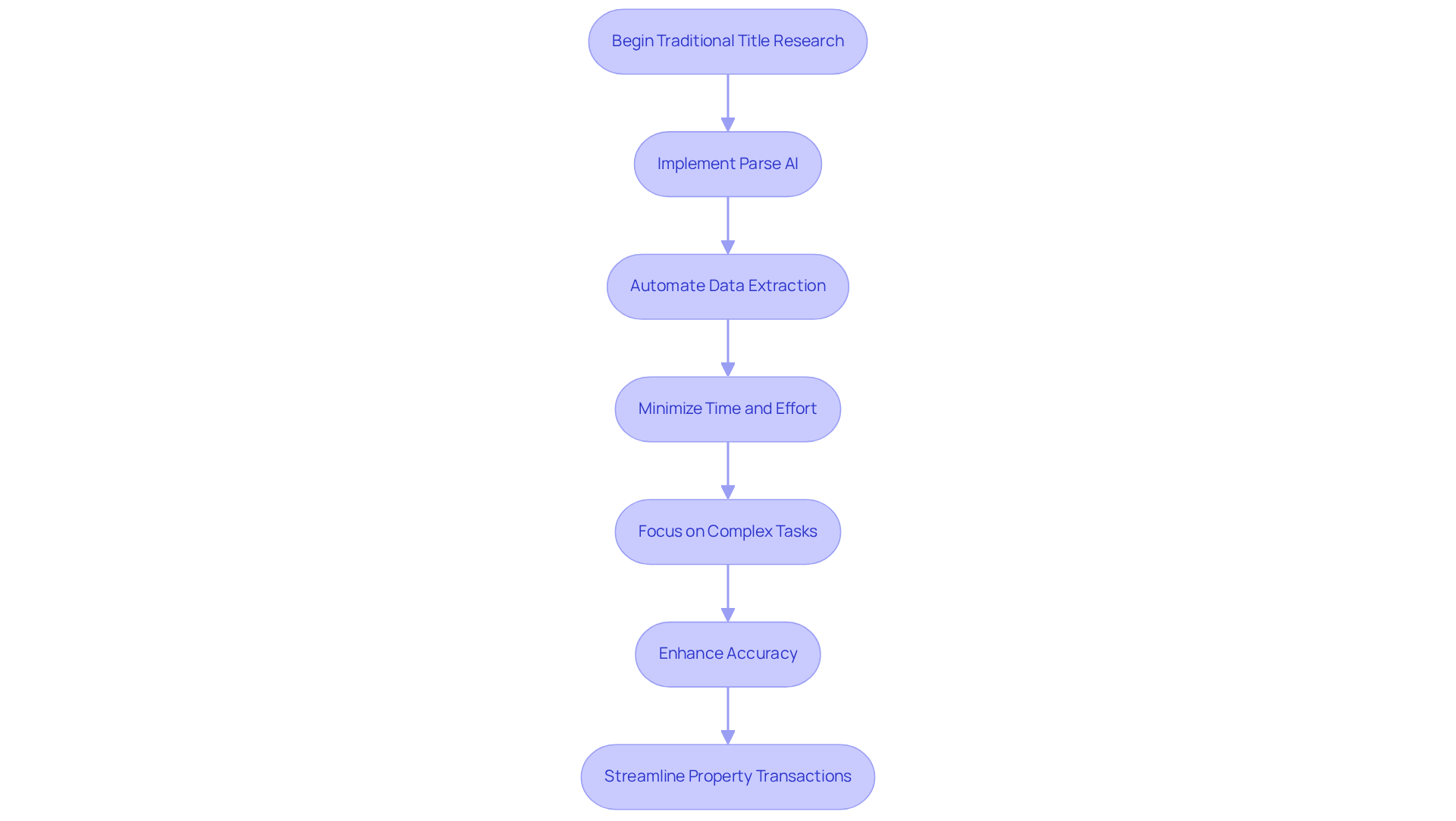
Accurate Property Ownership: The Foundation of Real Estate Transactions
The importance of digital land records is evident as they provide precise property ownership documentation, which is essential for the integrity of real property transactions and acts as the foundation for legal agreements. It ensures that buyers and sellers possess clear titles to the properties involved. Imprecise or obsolete documentation can result in disputes, legal challenges, and substantial financial losses. Notably, over 30% of real estate transactions are affected by inaccuracies, which can derail deals and erode trust among stakeholders. Recent legal conflicts, such as those related to title claims in urban developments, highlight the consequences of relying on inaccurate property information, underscoring the necessity for careful documentation.
Digital land records significantly enhance the accuracy of ownership information by providing easily accessible and verifiable data. This modernization lowers the risks linked to , enabling title researchers and realty professionals to operate with increased confidence. As noted by industry experts, "Clear ownership not only streamlines the registration process but also safeguards your investment." As the real estate landscape evolves, the importance of digital land records in maintaining up-to-date and precise ownership information cannot be overstated, benefiting all parties involved in the market. Consequently, title researchers are encouraged to regularly validate documents and consult legal experts to ensure compliance with local regulations, thereby minimizing the risk of disputes.
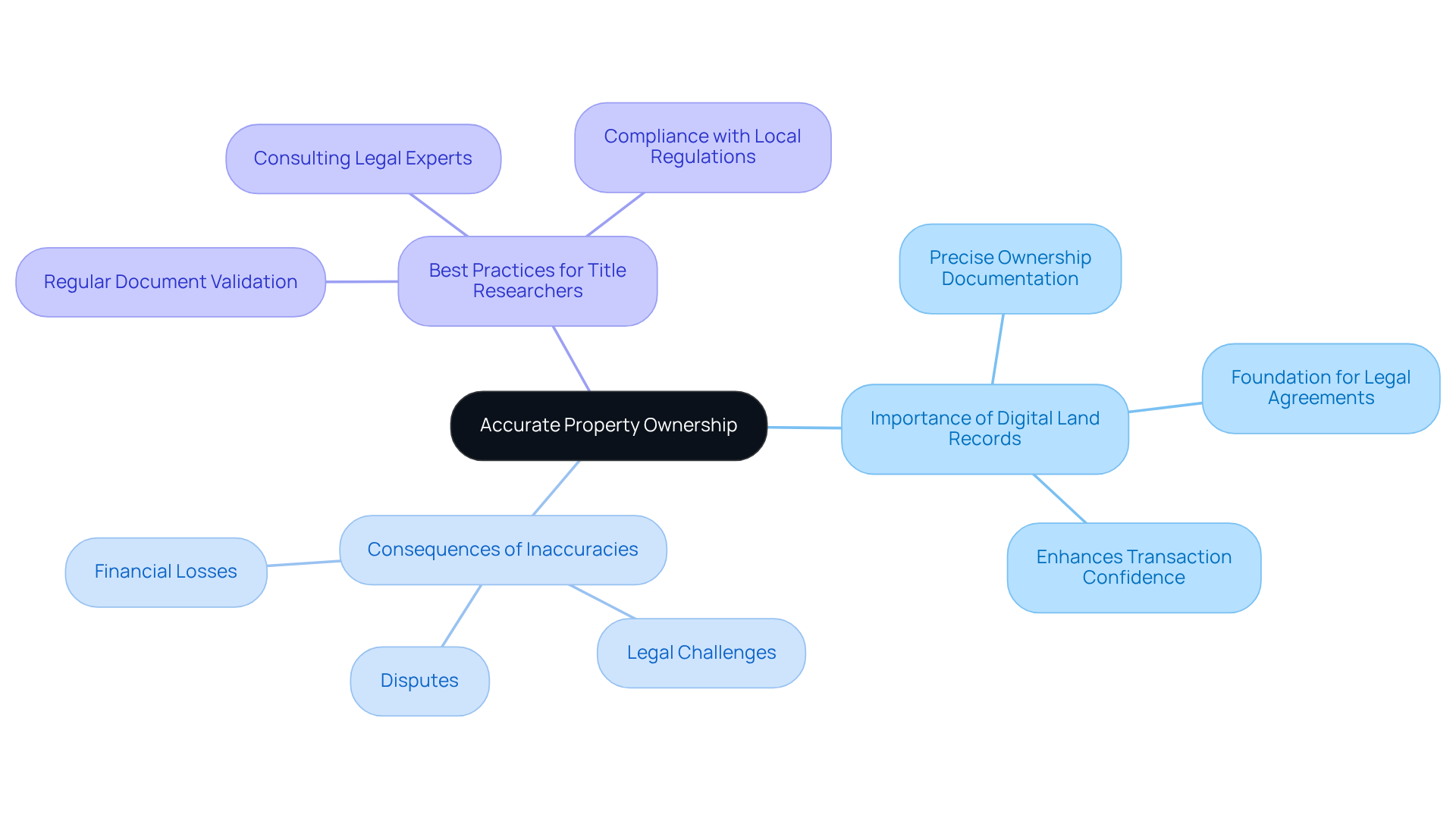
Enhanced Efficiency: Streamlining Title Research Processes
The importance of digital land records revolutionizes title research by significantly enhancing efficiency. The digitization of historical documents and the automation of data extraction enable title researchers to access and analyze information at unprecedented speeds compared to traditional methods. Recent statistics indicate that title researchers experience up to a 40% decrease in time spent on research tasks when utilizing electronic systems, allowing them to manage more cases simultaneously. This efficiency not only but also alleviates the workload on title researchers, leading to quicker deal closures.
Furthermore, real estate companies that have adopted these technological solutions, such as [specific firm names], report enhanced customer satisfaction and increased overall productivity, which underscores the importance of digital land records in contemporary real estate operations. As noted by [Title Researcher's Name], 'The shift to electronic systems has changed our workflow, enabling us to concentrate more on client relationships instead of paperwork.
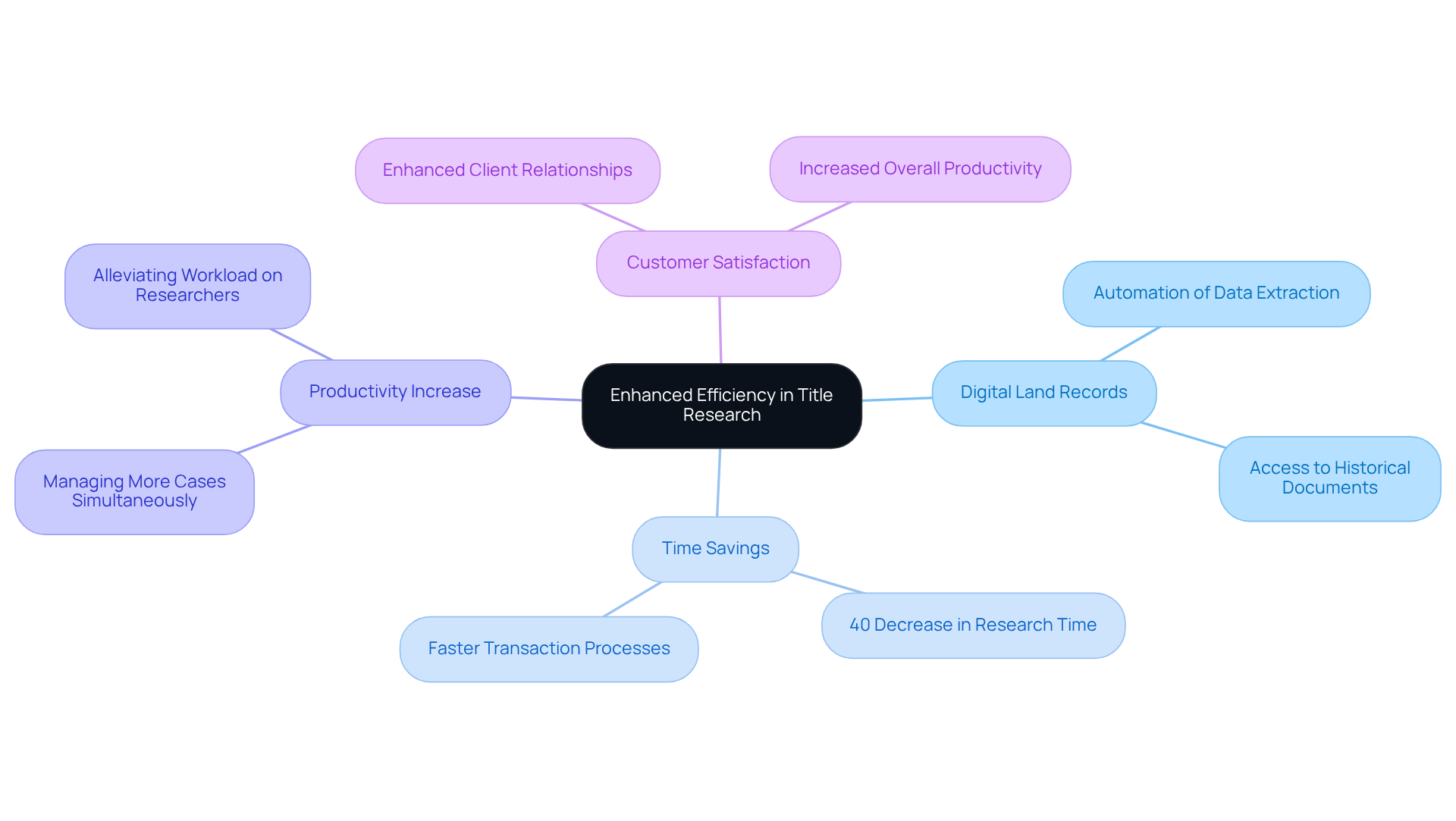
Improved Security: Protecting Sensitive Property Information
Digital property documentation significantly enhances the security of sensitive asset information compared to conventional paper systems. By employing advanced encryption and strict access control measures, these electronic systems effectively safeguard against unauthorized access and potential data breaches.
A study by IBM reveals that 90% of all cyber incidents stem from human error or behavior, underscoring the necessity of robust security measures. Organizations that have transitioned to electronic documentation report a notable decrease in fraud occurrences, with statistics indicating that electronic property files can reduce deceptive activities by as much as 30%.
This heightened security is crucial for maintaining the integrity of property ownership documentation, emphasizing the importance of digital land records in preventing fraud. By ensuring that only authorized individuals can access confidential information, electronic property documents foster confidence among stakeholders in the real estate market. This trust is essential for facilitating safer transactions, particularly in an era where in property information management have become increasingly prevalent.
For instance, in 2024, the healthcare sector encountered significant cybersecurity threats, accounting for 17% of all attacks, highlighting vulnerabilities in traditional systems. Consequently, the implementation of electronic property documentation underscores the importance of digital land records, as it not only protects confidential details but also strengthens the overall security framework of real property dealings.
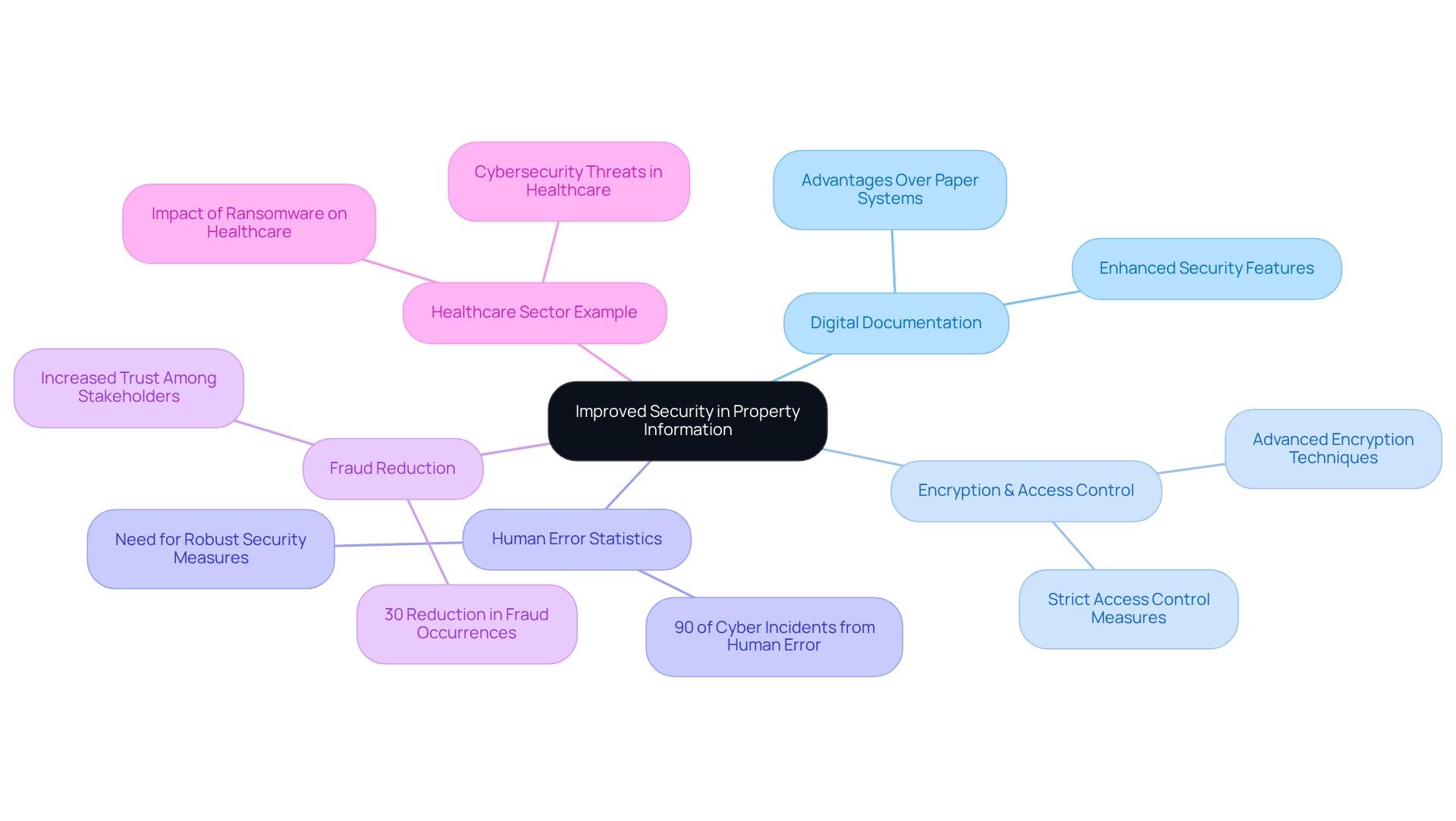
Increased Accessibility: Quick Access to Land Information
The accessibility provided by the importance of digital land records significantly empowers realty professionals to acquire property information swiftly from any location at any time. Traditional property transactions often require to finalize. However, this immediacy not only accelerates decision-making but also reduces transaction delays.
Furthermore, these electronic files facilitate seamless sharing among participants, fostering improved cooperation and interaction throughout the purchasing and selling process. Consequently, the real estate industry operates with greater efficiency, ultimately benefiting all parties involved.
The transition to electronic systems underscores the importance of digital land records, as it not only expands access to essential information but also substantially mitigates the risks associated with outdated and inaccurate documents. This includes threats such as fraud, manipulation, and errors in property documentation, which can lead to disputes over titles and ownership.
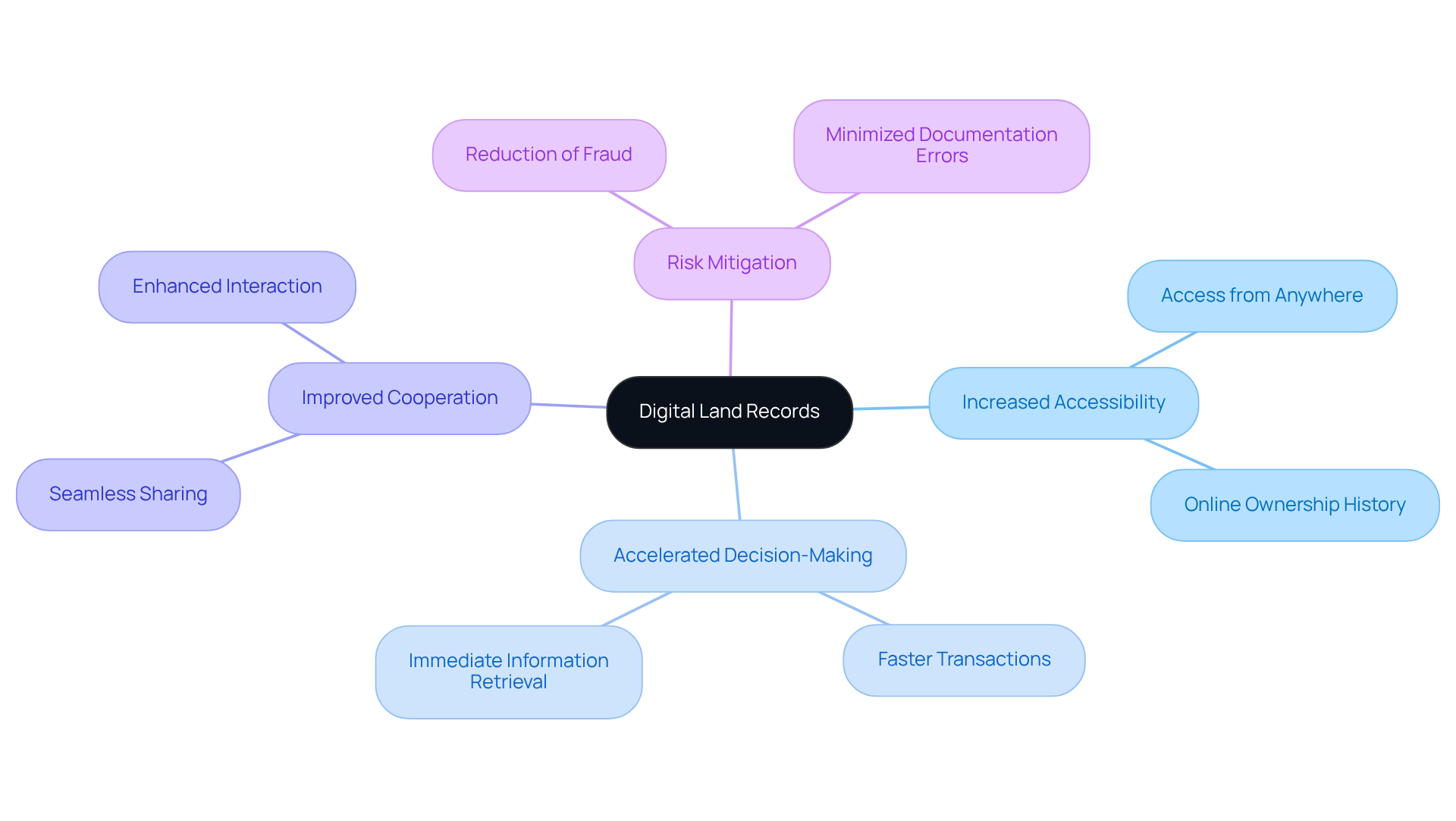
Cost Savings: Reducing Expenses in Title Research
The transition to electronic land records showcases the importance of digital land records by offering significant cost reductions for title research activities. By minimizing reliance on physical storage, reducing paper usage, and decreasing manual labor, real estate professionals can effectively lower operational expenses. Automation enhances efficiency, enabling title researchers to process more transactions in less time, which directly boosts profitability.
For instance, organizations that have adopted digital solutions report operational cost reductions of up to 30%, illustrating the financial advantages of this transition. A notable example is the computerization of property registries in Andhra Pradesh, which not only improved access to credit but also enhanced operational efficiency.
As Sandeep Sonthalia, a CEO in the property sector, observes, 'For property owners, the digitization of property documents offers substantial benefits. First, it provides greater security, reducing the risks associated with property ownership.'
Furthermore, Anshuman Magazine emphasizes that 'Access to more comprehensive, precise, and current information on property ownership, boundaries, etc., would lessen uncertainty and conflicts and conserve time.'
This combination of cost-effectiveness and improved service quality underscores the as an essential strategy for realty firms aiming to enhance their financial outcomes.
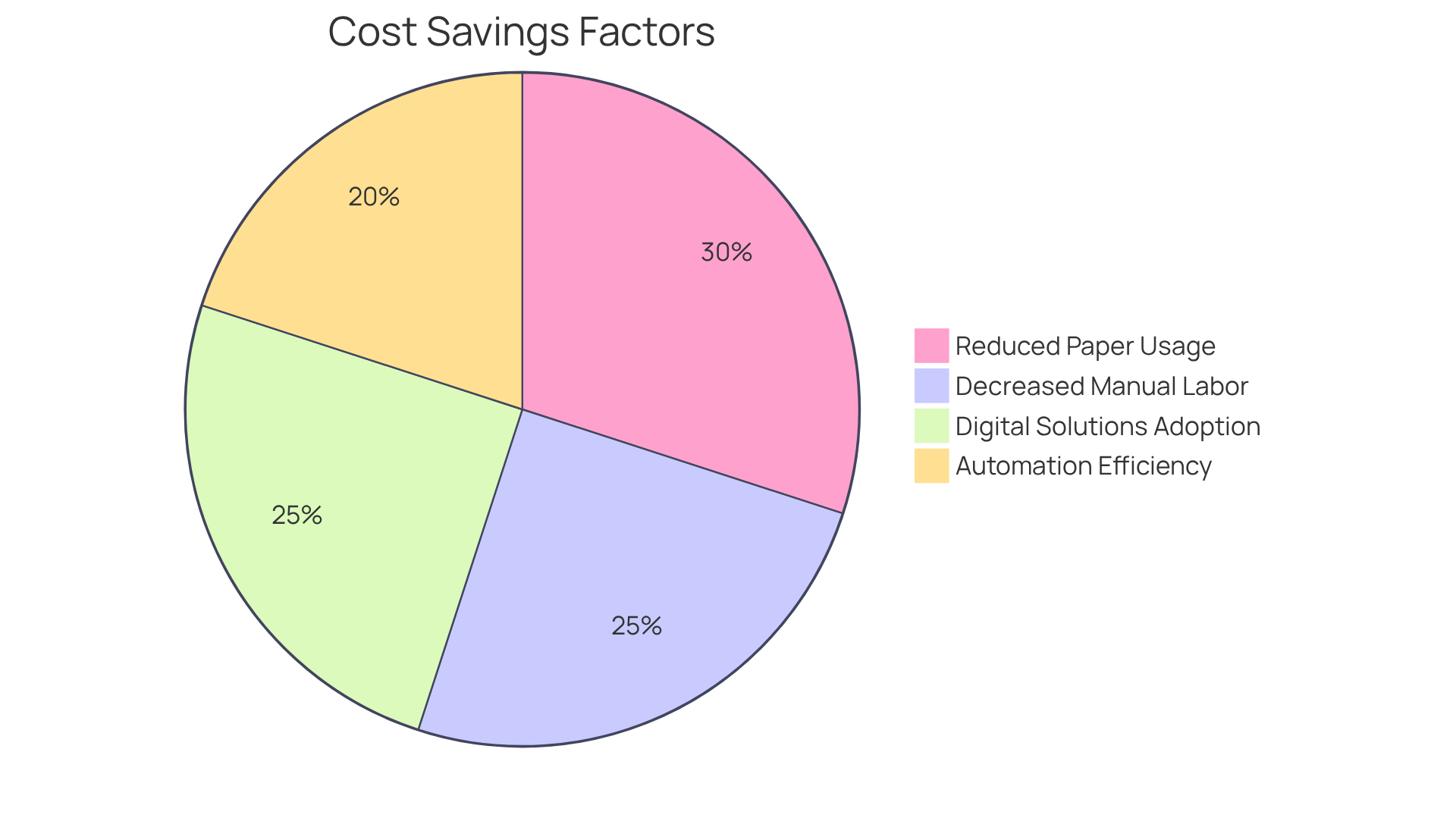
Environmental Benefits: Reducing Paper Waste Through Digitization
The importance of digital land records is pivotal in minimizing paper waste, thereby significantly enhancing environmental sustainability. Traditional record-keeping methods produce extensive paperwork, contributing to and escalating landfill waste. By adopting electronic formats, the real property sector can markedly lessen its ecological footprint while streamlining operations. This transition is not merely a technical upgrade; it emphasizes the importance of digital land records in aligning with corporate social responsibility initiatives and resonates with environmentally conscious clients and stakeholders, ultimately bolstering the reputation of real estate professionals. Firms that have embraced digital documentation report enhanced efficiency and a commitment to sustainability, which underscores the importance of digital land records in demonstrating how technology can drive positive environmental change within the sector.
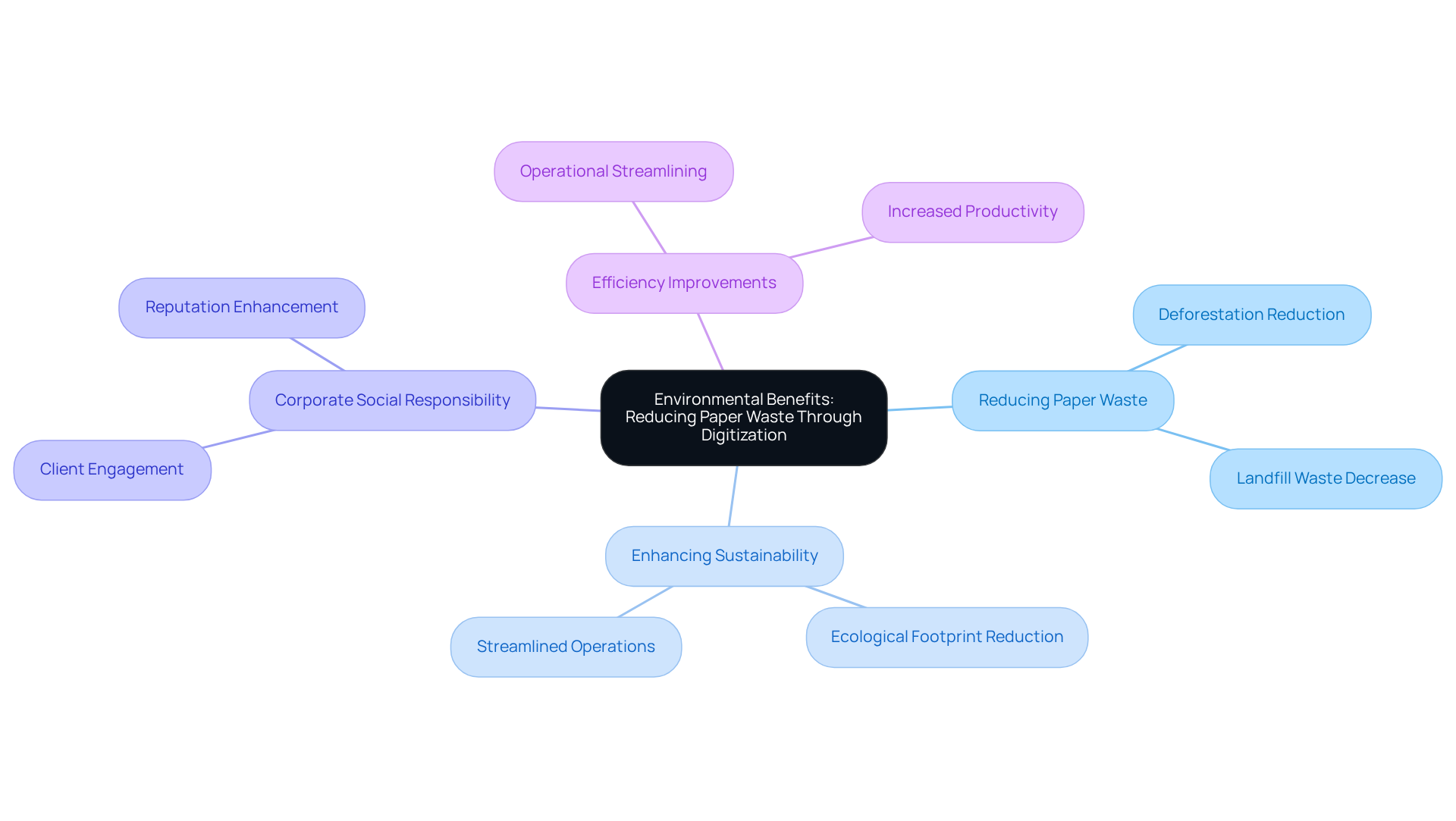
Facilitating Policy-Making: The Role of Digital Land Records
The efficient formulation of policies and urban development highlights the importance of digital land records. They provide precise, current information on property ownership and usage, enabling policymakers to make well-informed decisions that significantly impact community development and resource allocation. The clarity offered by these electronic files reduces opportunities for corruption and enhances accountability in property management.
As governments increasingly adopt data-driven strategies, the importance of digital land records in shaping policies becomes increasingly evident. Furthermore, digitized property documents streamline the transaction process, allowing for immediate access to information from centralized databases.
Cities that have implemented robust digital property record systems have seen improvements in urban planning outcomes, such as more effective space utilization and enhanced infrastructure development. Policymakers recognize that accurate geographic information is critical for sustainable urban development, with many advocating for its integration into planning processes.
As Saige Wang noted, 'Improving resource use efficiency is crucial and requires cooperative efforts from governments, corporations, and civil society.' This statement underscores the in transforming property documentation to foster responsible and informed decision-making within urban environments.
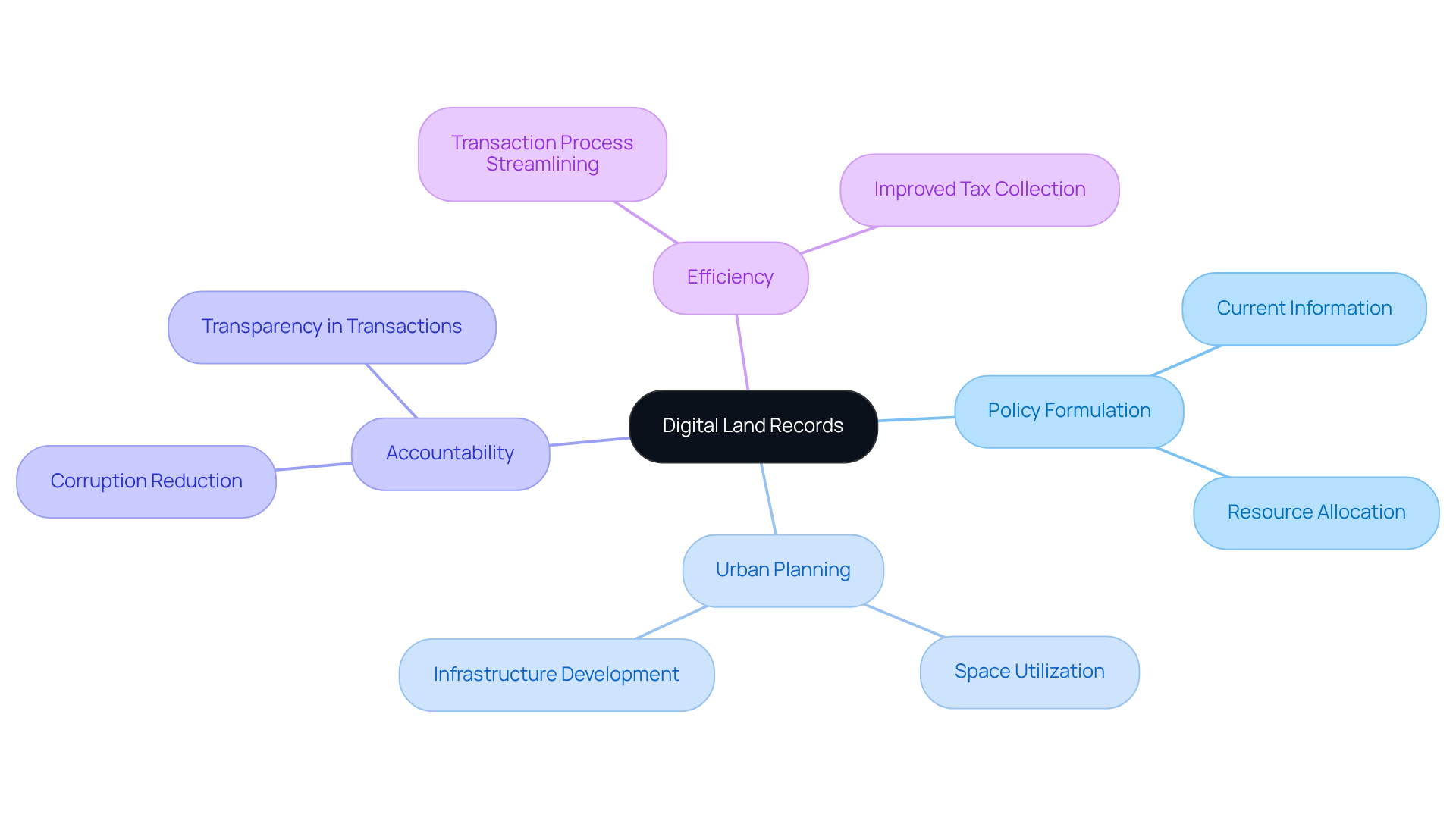
Challenges of Physical Records: Why Transition to Digital is Essential
Physical land documents pose significant challenges, primarily due to their vulnerability to damage, loss, and inaccessibility. Natural disasters, such as floods and fires, have historically devastated paper documents, leading to irretrievable losses that can severely impact property transactions. The National Centers for Environmental Information (NCEI) has documented numerous billion-dollar disaster events where essential documents were compromised, underscoring the risks associated with maintaining paper-based systems.
Furthermore, the manual retrieval of physical documents is not only time-consuming but also inefficient; studies indicate that employees spend up to three hours daily on manual data entry tasks, resulting in considerable delays in property transactions. This inefficiency is exacerbated by the fact that:
- 90% of businesses encounter document versioning issues
- 83% of workers report losing time due to these challenges
Notably, 45% of small and midsize enterprises still rely on paper documentation, highlighting the significance of this issue. These challenges emphasize the urgent need for a transition to electronic property documents, underlining the importance of digital land records, which provide enhanced security, improved accessibility, and streamlined processes, ultimately transforming the management of property information.
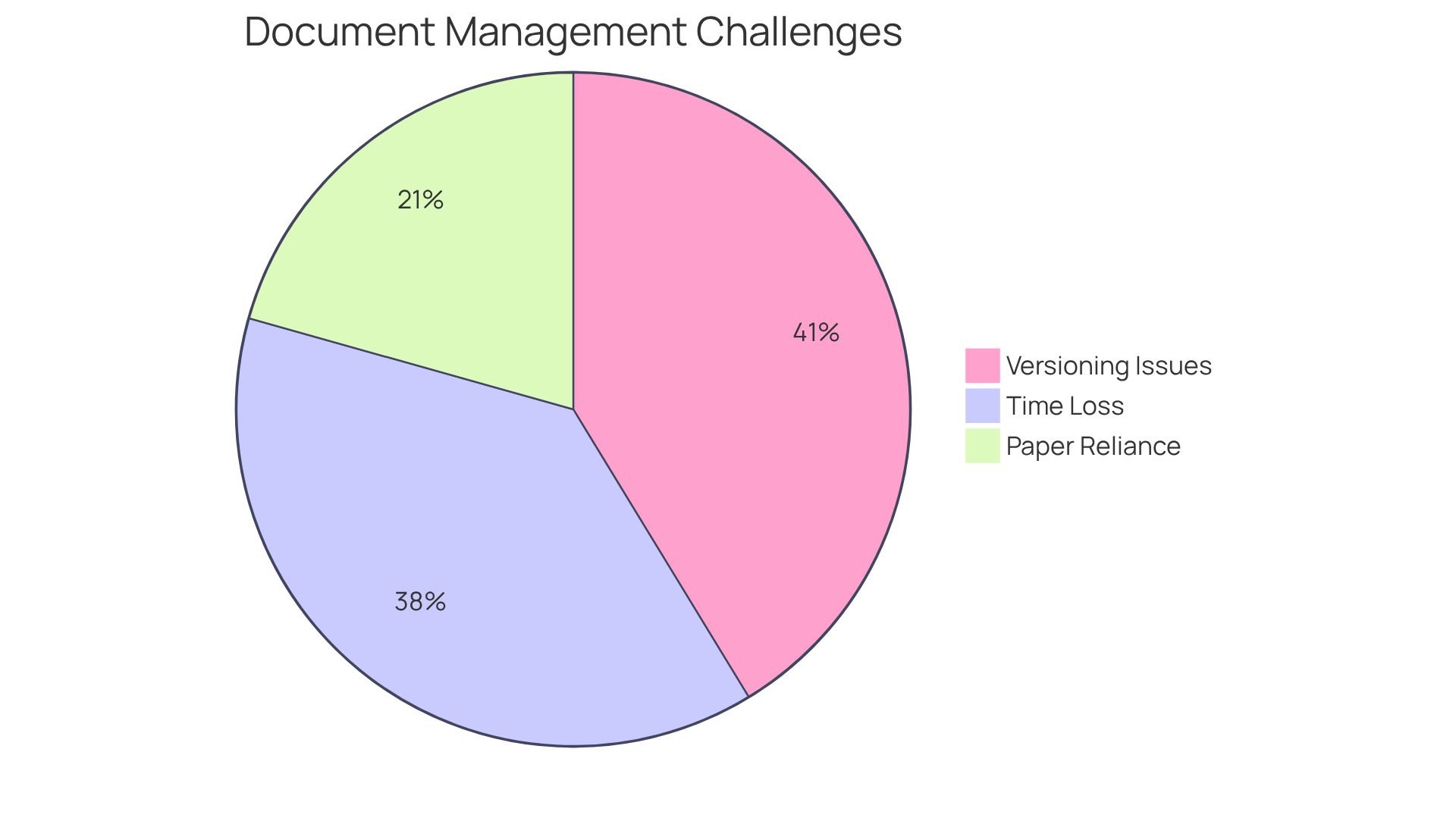
Transforming the Real Estate Industry: The Indispensable Role of Digital Land Records
Digital property documents are fundamentally transforming the real estate sector by significantly enhancing efficiency, precision, and accessibility. As stakeholders increasingly embrace digitization, traditional methods of managing property information are being supplanted by innovative electronic solutions. This transition streamlines title research processes, enabling and accelerating approval cycles, which can reduce transaction times from weeks to mere minutes.
Furthermore, the integration of electronic records fosters greater transparency and trust among purchasers, vendors, and decision-makers, thereby mitigating risks associated with fraud and disputes. Industry leaders assert that the future of land information management lies in these technological advancements, with many highlighting improved operational efficiencies and heightened customer satisfaction as key drivers of this transformation.
Statistics indicate that online workplaces can boost productivity by as much as 30%, underscoring the tangible benefits of this evolution. However, challenges such as employee resistance and compliance concerns persist as significant barriers to successful technological transformation.
Consequently, as the real estate landscape continues to evolve, the importance of digital land records will become increasingly indispensable, shaping the future of real estate transactions and ensuring a more efficient and secure marketplace.
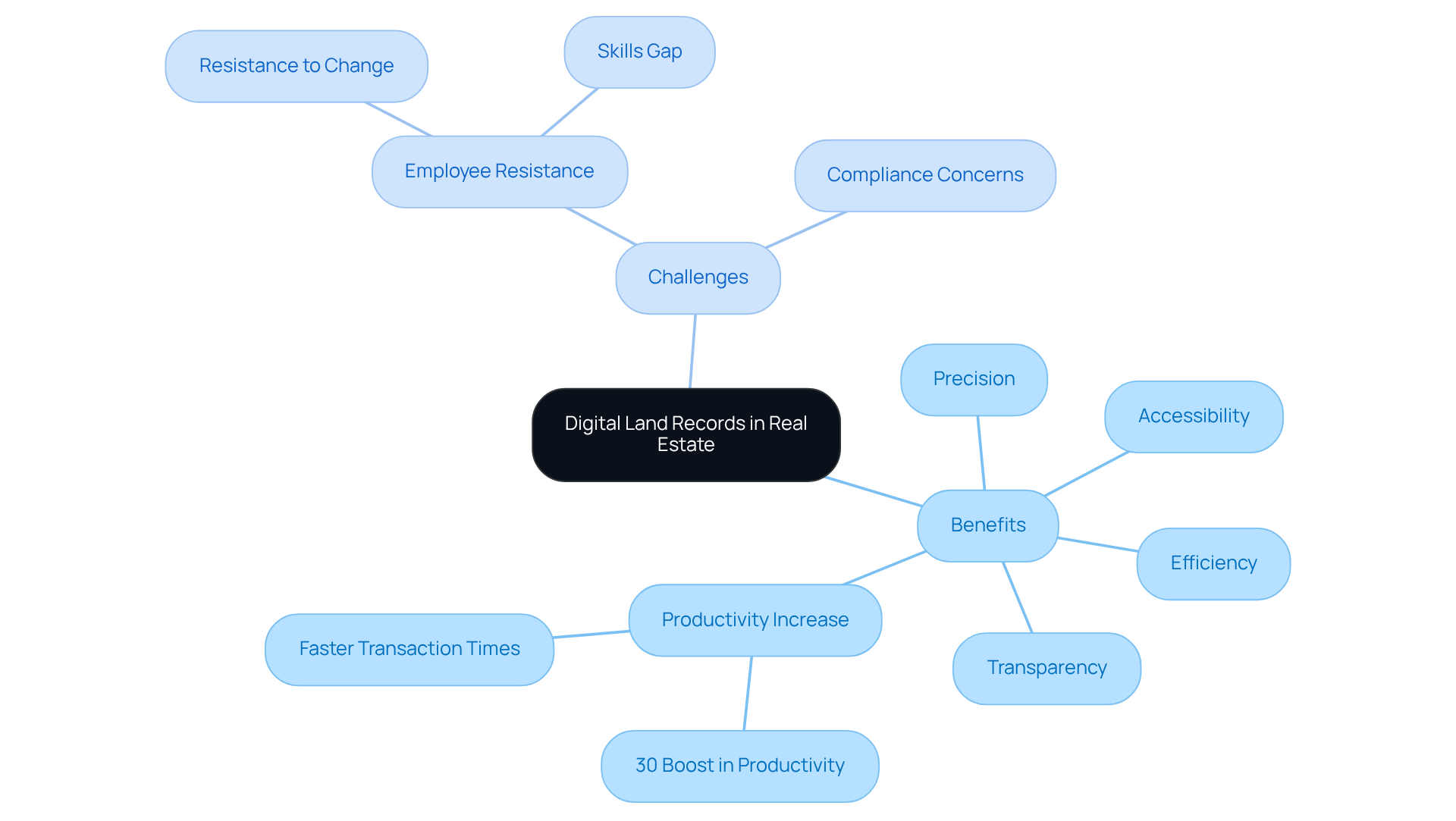
Conclusion
Digital land records are transforming the real estate industry by significantly enhancing accuracy, efficiency, and security in property transactions. The shift from traditional paper-based systems to digital documentation streamlines title research and mitigates risks associated with inaccuracies and fraud. By providing immediate access to reliable ownership information, these digital records empower realty professionals to operate with greater confidence, ultimately fostering trust among all stakeholders involved in property dealings.
Several key reasons underscore the importance of digital land records. These include:
- Improved efficiency through automation
- Enhanced security measures to protect sensitive information
- Increased accessibility for swift information retrieval
- Significant cost savings for real estate firms
- Environmental benefits from reduced paper waste
Furthermore, digital records facilitate informed policy-making by providing accurate data that can guide urban development and resource allocation. The challenges posed by physical records, such as vulnerability to damage and inefficiency, underscore the urgent need for this transition.
As the real estate landscape continues to evolve, embracing digital land records is paramount for professionals aiming to remain competitive. The integration of technology in property documentation not only supports operational efficiency but also aligns with sustainability goals, reflecting a commitment to responsible practices. Stakeholders are encouraged to adopt these advancements to ensure a more secure, efficient, and environmentally friendly future in real estate transactions.
Frequently Asked Questions
What is Parse AI and how does it benefit title research?
Parse AI is a technology that utilizes advanced machine learning algorithms to automate the title research process. It allows for the rapid extraction of critical information from large collections of title documents, significantly reducing the time and effort required for traditional title searches. This automation enables title researchers to focus on more complex tasks, leading to quicker and more accurate confirmations of property ownership.
How does digital land record accuracy impact real estate transactions?
Accurate digital land records are essential for providing clear property ownership documentation, which is crucial for the integrity of real estate transactions. Inaccurate or outdated records can lead to disputes, legal challenges, and significant financial losses. Over 30% of real estate transactions are affected by inaccuracies, emphasizing the need for precise documentation to avoid derailing deals and maintaining trust among stakeholders.
What are the advantages of digitizing title research processes?
Digitizing title research processes enhances efficiency by allowing title researchers to access and analyze information much faster than traditional methods. Statistics show that researchers can experience up to a 40% reduction in time spent on research tasks when using electronic systems. This increased efficiency not only speeds up transaction processes but also reduces the workload on researchers, facilitating quicker deal closures.
How do digital land records benefit title researchers and real estate professionals?
Digital land records provide easily accessible and verifiable data, which enhances the accuracy of ownership information and lowers the risks associated with property transactions. This modernization allows title researchers and realty professionals to operate with greater confidence, ensuring compliance with local regulations and minimizing the risk of disputes.
What impact does automation have on the productivity of real estate companies?
Automation in title research has been shown to enhance productivity and reduce operational costs for real estate companies. Firms that have adopted these technological solutions report improved customer satisfaction and increased overall productivity, allowing them to manage more cases simultaneously and focus more on client relationships rather than paperwork.




